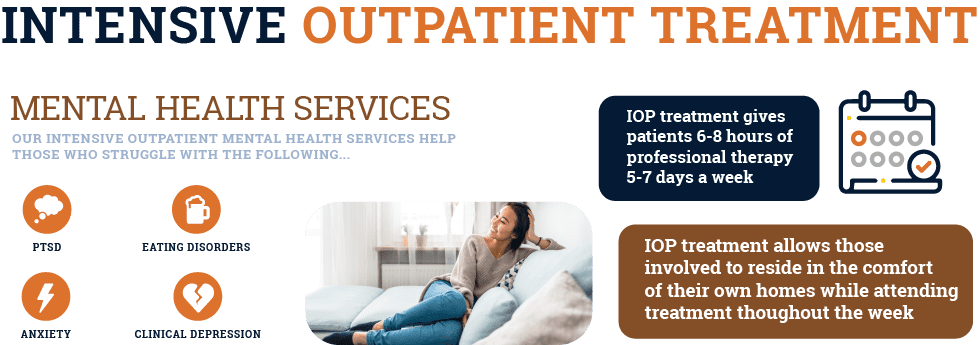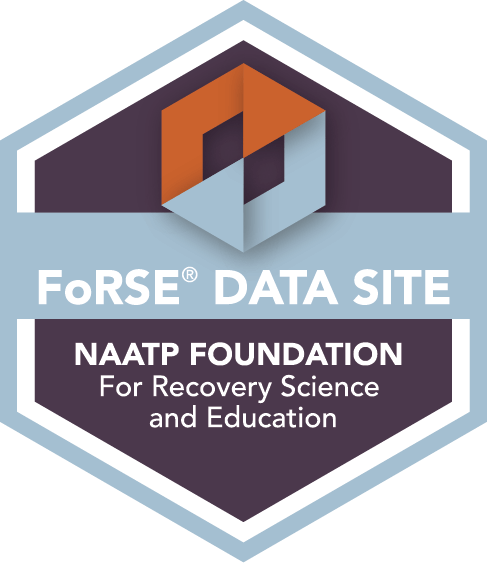
Our intensive outpatient program provides the structured support many individuals need to rebuild their lives while maintaining daily responsibilities. With nearly 21 million Americans battling addiction every year, effective treatment options like ours are more important than ever.
Our intensive outpatient program helps patients develop the coping skills they need without making them choose between sobriety and commitment. For families seeking structured support closer to home, our teen IOP Illinois provides evidence-based therapy and guidance specifically designed for adolescents. Learn more about outpatient treatment programs for addiction and mental health, and discover how they can help individuals achieve sobriety.

WHAT IS AN INTENSIVE OUTPATIENT PROGRAM?
IOPs typically involve the use of several evidence-based therapies per week. These may include individual counseling, group therapy, family therapy, and relapse prevention sessions. These programs focus on addressing the root causes of addiction, teaching coping strategies, and providing tools for long-term recovery. They are particularly valuable for individuals who do not require 24/7 supervision but still need a high level of support to overcome substance use disorder.

INTENSIVE OUTPATIENT PROGRAM EXPECTATIONS
Regular attendance is a critical part of an IOP. Most programs require individuals to attend multiple therapy sessions each week, which typically last several hours. Consistency is key, as the structured schedule provides the support and accountability needed to make progress. By showing up regularly, participants ensure they are fully immersed in the treatment process.
IOPs place a strong emphasis on therapy, which includes individual therapy, group therapy, and sometimes family counseling. A typical IOP might require the client to submit to 6-8 hours of intensive therapy, 5-7 days a week. The exact numbers will depend on the depth of the client’s addiction.
Patients are expected to actively participate by engaging in discussions, exploring personal challenges, and practicing new skills introduced during these sessions. This involvement not only promotes self-awareness but also helps build a strong foundation for lasting change.
Successful recovery requires dedication beyond attending scheduled sessions. Participants are expected to work on their goals outside of the program, whether that means practicing coping skills, attending support group meetings, or reflecting on personal growth. Maintaining a positive and proactive attitude is essential.
Each individual has unique needs, which is why IOPs create customized treatment plans tailored to address specific challenges, including mental health concerns and co-occurring disorders. Participants are expected to follow their treatment plan by attending regular sessions and completing therapeutic assignments designed to support their long-term goals.
One of the benefits of an intensive outpatient program is the ability to continue with daily responsibilities, such as work, school, or family duties, while receiving treatment. However, this requires good time management and prioritization. Participants are encouraged to integrate strategies into their everyday routines, fostering resilience and preparing them for life after treatment.
Accountability is a core element of an intensive outpatient program. Patients are expected to remain honest about their struggles, progress, and any challenges they encounter during recovery. Open communication with therapists and peers helps create a supportive and collaborative environment, making the program more effective.
By fully committing to these expectations, individuals in an IOP can make meaningful strides toward recovery while maintaining a balanced and productive life. The program’s flexible structure allows participants to heal and grow without having to completely step away from their everyday responsibilities.
What Types of Therapy Are Available in an Intensive Outpatient Program?
- Individual Therapy: Individual therapy sessions play a crucial role in an IOP, providing a safe and private environment for participants to explore their challenges. A licensed therapist works closely with individuals to identify the root causes of their addiction, address co-occurring mental health disorders, and develop coping strategies.
- Group Therapy: Group therapy fosters a sense of community and shared understanding among participants. Facilitated by trained professionals, these sessions allow individuals to share their experiences, learn from others, and build social support networks. Group therapy often focuses on topics like relapse prevention, stress management, and developing healthy relationships.
- Family Therapy: Family therapy sessions are a vital component of many IOPs, as addiction often impacts loved ones. These sessions provide a space for families to heal together by addressing communication issues, rebuilding trust, and educating family members about addiction and the treatment process.
- CBT: Cognitive behavioral therapy (CBT) is an evidence-based approach widely used in IOPs to help participants identify and challenge negative thought patterns that may contribute to substance use. By replacing these patterns with healthier ways of thinking, individuals can develop better coping mechanisms. CBT also equips participants with practical tools to handle cravings, manage stress, and build resilience.
- DBT: Dialectical behavior therapy (DBT) is another evidence-based approach commonly available in IOPs, especially for individuals dealing with intense emotions or co-occurring mental health conditions like borderline personality disorder. DBT focuses on teaching skills in mindfulness, emotional regulation, distress tolerance, and interpersonal effectiveness. These skills help participants manage overwhelming emotions and improve their relationships.
- Holistic and Complementary Therapies: To support overall well-being, our IOP includes holistic therapy options like mindfulness meditation, yoga, or art therapy. These approaches complement traditional therapies by helping individuals reduce stress, improve self-awareness, and foster a sense of balance in their lives.
Why Choose Intensive Outpatient Substance Abuse Or Mental Health Treatment?
- Key personalized treatment plans tailored to individual needs
- Compassionate and experienced staff
- Evidence-based approaches like CBT, DBT, and trauma-informed care

There are also several reasons why clients prefer intensive outpatient treatment to other forms of care:
- They may have financial obligations that require the individual to keep working
- There are primary care responsibilities for a child or an elderly parent
- Overall affordability (less expensive than residential treatment)
- It offers a great follow-up to a residential treatment program
- Work or school responsibilities
Selecting the right treatment center is a critical step in your journey. Northern Illinois offers an intensive outpatient program that stands out for its comprehensive care, personalized approach, and supportive environment. Whether you’re seeking help for substance abuse, mental health conditions, co-occurring disorders, or through our fentanyl detox center, Northern Illinois is committed to guiding you toward lasting recovery.

Insurance Coverage and IOPs
That doesn’t mean that they will provide enough coverage to help you pay for outpatient care. Our treatment center can help you verify your insurance to make sure that an IOP makes sense for your budget.
Intensive Outpatient Program FAQs
Yes, IOP is widely recognized as an effective form of treatment. It provides structured therapeutic care while allowing individuals to live at home and maintain work or school commitments, which supports the integration of recovery skills into daily life. IOP is effective for treating substance use disorders and mental health conditions, often yielding outcomes comparable to residential treatment.
IOP can treat a variety of substance addictions. IOP is a good treatment option for those with less severe substance abuse issues or who have already completed a residential program. At Northern Illinois Recovery Center, we offer IOP for addictions to substances such as:
- Alcohol
- Opioids
- Methamphetamines
- Stimulants, like cocaine
An intensive outpatient program plays a vital role in addressing mental health challenges and dual diagnosis disorders, which occur when someone struggles with both substance use and mental health issues, like anxiety, depression, or PTSD, and may require specialized co-occurring disorders rehabs for comprehensive care. Effective recovery requires treating both conditions simultaneously, and IOPs are uniquely equipped to meet this need.
IOP doesn’t include detox treatment, though individuals who need it can attend a detox program before IOP. Detox may be a requirement for some, as it can enable more effective treatment and offer medical supervision during withdrawal symptoms. For others with less severe addictions, patients may be able to start with IOP treatment.
The duration of an intensive outpatient program for addiction or mental health treatment can vary widely depending on individual needs, progress, and the complexity of each person’s circumstances. Typically, an IOP lasts anywhere from 8 to 12 weeks, with participants attending evidence-based treatments several times per week. However, the program can be extended or modified based on each person’s unique situation and recovery goals.
Insurance may cover IOP treatment, but this depends entirely on your specific plan and provider. Most major insurers do offer some level of coverage for these programs, as they are a recognized form of mental health and substance use treatment. Our admissions team is available to help you understand your benefits and verify your insurance coverage.

Comprehensive Intensive Outpatient Programs For Substance Abuse And Dual Diagnosis
This also allows our counselors and clinicians to choose and customize addiction treatment plans for each client. At the end of the day, our success depends on the ability of our clients to remain in recovery long-term. Here are some of our treatment programs and services:
- Outpatient programs
- Primary inpatient and extended (more than 90 days) inpatient programs
- Aftercare programs like sober living homes
- Dual diagnosis treatment
- Partial hospitalization program (PHP)
If you’re struggling with addiction but can’t enroll in inpatient care, an intensive outpatient program might be the best choice for you. Addiction is a disease that claims victims every day, but we can help!
Our Intensive Outpatient Program in Illinois






